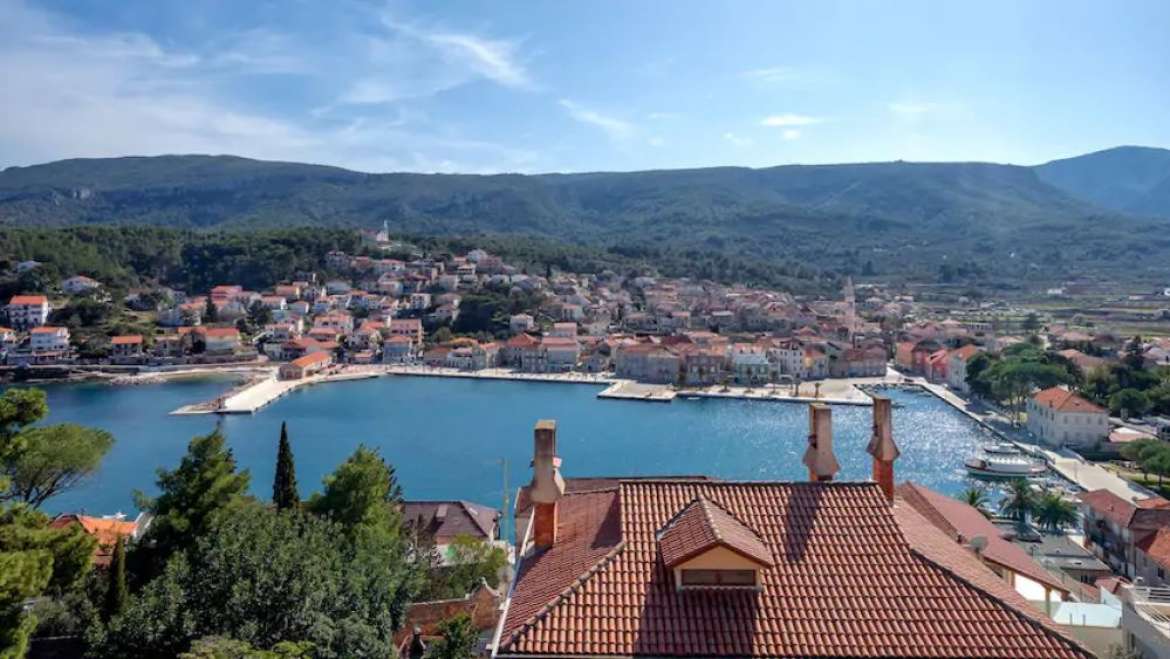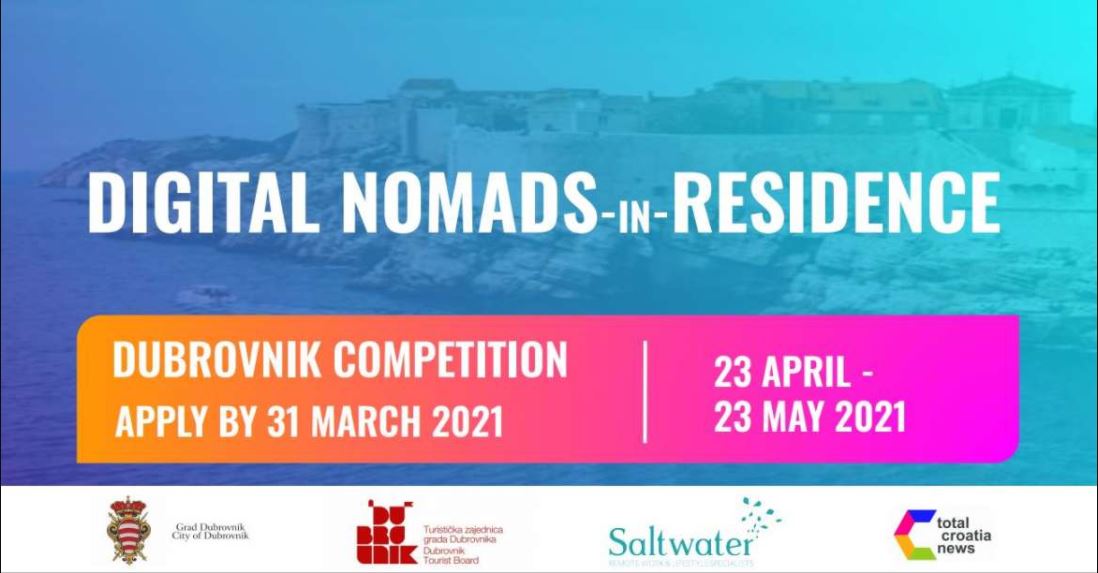Croatian-American Psychology Professor Mala Matacin on Gender Equality in Croatia
March 8, 2021 - "It's not discrimination, but I noticed that my gender mattered differently in Croatia in terms of marital status and traveling alone," said Croatian-American Psychology Professor Mala Matacin about gender equality in Croatia.
Like every year, 2021 is no different, and March 8 is marked as International Women's Day. The day that celebrates women's emancipation but sadly reminds us that the battle for true equality is still ongoing. Given that massive gatherings still aren't recommended due to the coronavirus pandemic, the annual Noćni Marš (Night March) in Zagreb will not be held this year as confirmed by the feminist collective Faktiv that regularly organizes the event. On the other hand, this year has seen gruesome stories and confessions of sexual abuse, harassment, and even rape all over the Balkans and Croatia too, as is evident by the posts and public outcry gathered by Nisam tražila (I didn't ask for it), an initiative that connects women (as well as male victims of sexual violence) and provides a safe space to share their stories anonymously). What do these recent events tell us about gender equality and does Croatia fall behind on gender equality compared to the US or other Western countries?
Dr. Mala Matacin is a born American. If that sounds odd, it's not just because of the Croatian surname but also because her name is a female gender version of the Croatian noun for „little“ (malo). Her father is from Preko on the island of Ugljan and her grandfather on her mother’s side was from Gromača, a village near Dubrovnik. From September 2019 to March 2020, she was on an academic sabbatical in Croatia where she still has a family and is very enthusiastic about re-visiting post-pandemic. Apart from being on a quest for her family’s roots, she spent her time meeting with academics and students at several universities and learning from activists. One of the highlights of her time here was being able to attend and participate in „Night March“ last International Woman’s Day. When it’s safe to travel, she hopes to bring students to Croatia for a short-term study abroad program.
Matacin has a Ph.D. in Social Psychology with post-doctorate training in Behavioral and Preventive Medicine. She is teaching at the College of Arts and Sciences, the University of Hartford in the state of Connecticut. Her research is focused on women’s health (primarily in the issues of body image and stress), women’s leadership, and the relationship between images and social change. Matacin also has an interest in gender issues and she started and teaches a course „Women, Weight, and Worry” which according to the official Hartford University website is a „popular University honors course“. She also teaches a freshman year course “Beauty, Body Image, and Feminism”. She has designed two new University courses—one focused on systems of oppression and the other focused on photography and activism. Additionally, Dr. Matacin is the founder and faculty advisor for “Women for Change”, a campus organization focused on gender and other equity issues. She has received multiple awards for her work (“Outstanding Teacher Award” in 1999, “Excellence in Service to Students” in 2010 by Sigma Alpha Pi, the National Society for Leadership and Success, “Innovation in Teaching and Learning Award” in 2018, the “Roy E. Larsen Award for Excellence in Teaching and Contributions to University Life” and “Outstanding Faculty Award” in 2019). A 2009 post-graduation survey done by the Career Center named Dr. Matacin one of the three top faculty members in the entire University of Hartford community as a faculty member who had a major/positive impact on students. Just last weekend, during the opening ceremony of the Association for Women in Psychology virtual conference, she received the organization's mentoring award.
I spoke to her about her experiences from Croatia, legal frame, Sex-ED, and what does she overall think about gender equality in the country compared to the US.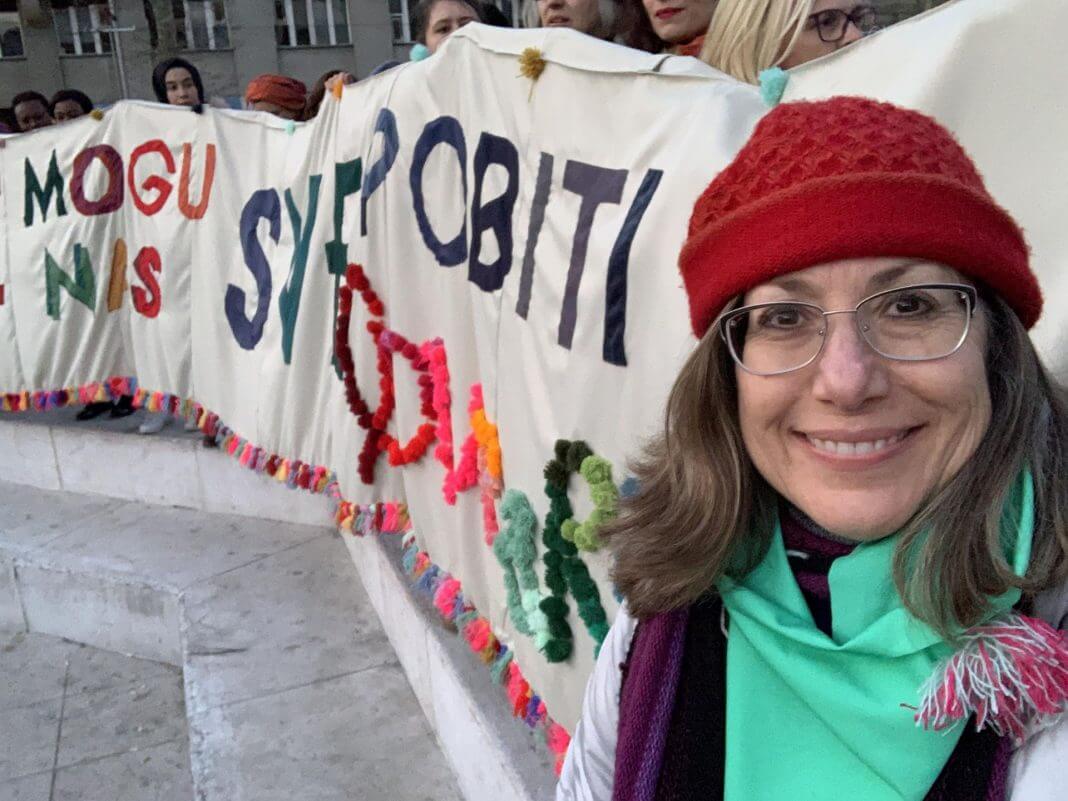
prof. Mala Matacin at Noćni marš (Night March) / private archive
You first came to Croatia in 2020. You participated in the Noćni Marš in 2020 for the International Women's Day in Zagreb. Can you tell us more about how you came about with the organizers, you even hosted workshops for the participants right?
On March 1, 2019, I attended a workshop organized by Faktiv (a feminist collective) and Le Zbor (the first mixed lesbian-feminist choir/band) to learn the “Patrijarhat Siluje" chant and performance. “Patrijarhat Siluje" (Patriarch Rapes) is a translation of the Chilean protest anthem (“Un Violador en Tu Camino”) about rape culture and victim shaming. We learned the chant and choreographed performance to perform during the march (Noćni Marš). At the workshop, I also met several women who were part of Žene ženama, an organization that provides a safe space for women who are refugees/asylum seekers and call Croatia their home. I’m grateful to this organization for generously including me and marching behind their banner on March 8th (Noćni Marš ). In the United States, I participated in similar chants and dances to protest violence against women and girls. So, being in Zagreb for International Women's Day was an extraordinary experience for me. Over 7,000 people took to the streets for Noćni Marš starting from Trg žrtava fašizma. The theme was Živio feminizam! Živio 8 Mart (Long live feminism! Long live March 8th!) and I was honored to stand with my Croatian sisters and meet new friends and colleagues at the protest.
What do you think about Croatian gender equality activists? From what you had the chance to see, are they doing a good enough job in advocating solutions to these problems, or is there something they still have to learn from their colleagues in the US or other western countries?
I spent most of my time connecting with scholars doing academic work on issues related to gender and didn't meet activist groups until March. My unexpected return to the United States that month due to the coronavirus did not leave me with as much time to interact as I wanted to. What I did experience was quite similar to those I'm familiar with—intelligent, good community organizing, active in their efforts to address gender and other social inequities, warm and generous (as evidenced by their willingness to accept me into their midst), and finding creative ways to get their message across. Activism is most commonly associated with public protest and marches, but artists can use their medium (for example, poetry, photography, performance, music) to challenge systemic injustices, and I was able to see and meet several artists in Croatia who were doing that.
Were you informed about gender equality problems in Croatia before coming to the country or was meeting up with activists in Croatia an eye-opener for you? Was there something about them that surprised or shocked you that you didn't expect to hear?
I was on my academic sabbatical in Croatia from September 2019 – March 2020. In preparation for coming to Croatia, I tried to read as much as I could about the state of affairs for women and the LGBTQ+ community and the country's efforts to address gender inequalities. For example, I found out about the Ombudswoman's Office for Gender Equality and was lucky to meet with two representatives in the office in February 2020, I spent the first three months of my time in Croatia in Dubrovnik and the last four months in Zagreb. This is important because I found a difference between these two parts of the country. Dubrovnik is more conservative and it wasn't until I got to Zagreb that I found people doing activist work. Also, although I am American-born, I am Croatian on both parents' sides. As such, I'm familiar with the patriarchal Croatian family dynamics; in fact, it's one of the reasons I'm so interested in gender issues because it's personal.
It's such a great question about anything that surprised or shocked me. I probably could write an entire article on the things that were surprising (and I should!), but as for shocking—there is one—the #MeToo movement not gaining traction in Croatia. In the United States, the movement exploded in 2017 and was very much part of the country's narrative but I found it surprisingly absent in Croatia. Instead, I learned about the #spasime movement which is centered around domestic violence (very much focused on the family unit). Thanks to you, I have also been made aware of „Nisam tražila“ which some are arguing is the Balkans #MeToo movement. What is striking to me is the similarity in the way both #MeToo and „Nisam tražila“ gained „sudden“ attention and visibility—both were popularized by actresses within their respective countries. In this way, there is value to those who can use their privilege to bring attention and visibility to social injustices that grass-roots activists spend most of their lives addressing.
You are born in the US but aware and proud of your Croatian roots. The Croatian diaspora is big and quite well-formed in the US. Are you associated with other Croats in the US and how does the diaspora feel and think (if it even follows) the gender inequality in the country? The liberal stream in Croatia often looks negatively on the diaspora as they see them as conservative, uninformed, or indifferent about the actual problems in Croatia despite having and exercising voting rights on Croatian elections. Do you vote as well?
Unfortunately, I have never lived in a part of the U.S. where there has been a strong, well-connected Croatian community. Much to the dismay of extended family who did grow up within the Croatian diaspora, my siblings and I do not speak Croatian and are overall less immersed in Croatian culture. But, I think this has had its benefits too. As you suggest, my experience with the Croatian diaspora in the United States is more conservative and indifferent to problems in Croatia, particularly as it relates to women. There is a phrase I learned when I was in Croatia—tako je—which seems to be spoken when one has given up on trying to solve an issue or there is simply an acceptance for „what is“. Had I grown up fully absorbed in the Croatian community in the U.S., I might be more accepting of „what is“ when it comes to fighting injustice. Ironically, my being steeped in a deeply Catholic family as a child instilled this sense of fighting for marginalized groups. I went to college at a Jesuit University and the Jesuits are well-known in the Catholic tradition as being socially progressive. I guess you can say that my feminist awakening happened within the context of a Catholic institution that taught me to challenge ideas and commit to social justice.
I absolutely vote here in the U.S. but have no voting rights in Croatia as I'm not a citizen. I was actually in the midst of getting my Croatian citizenship when I had to leave Zagreb last March. I'm still really sad that I could not complete the final steps when I was there.
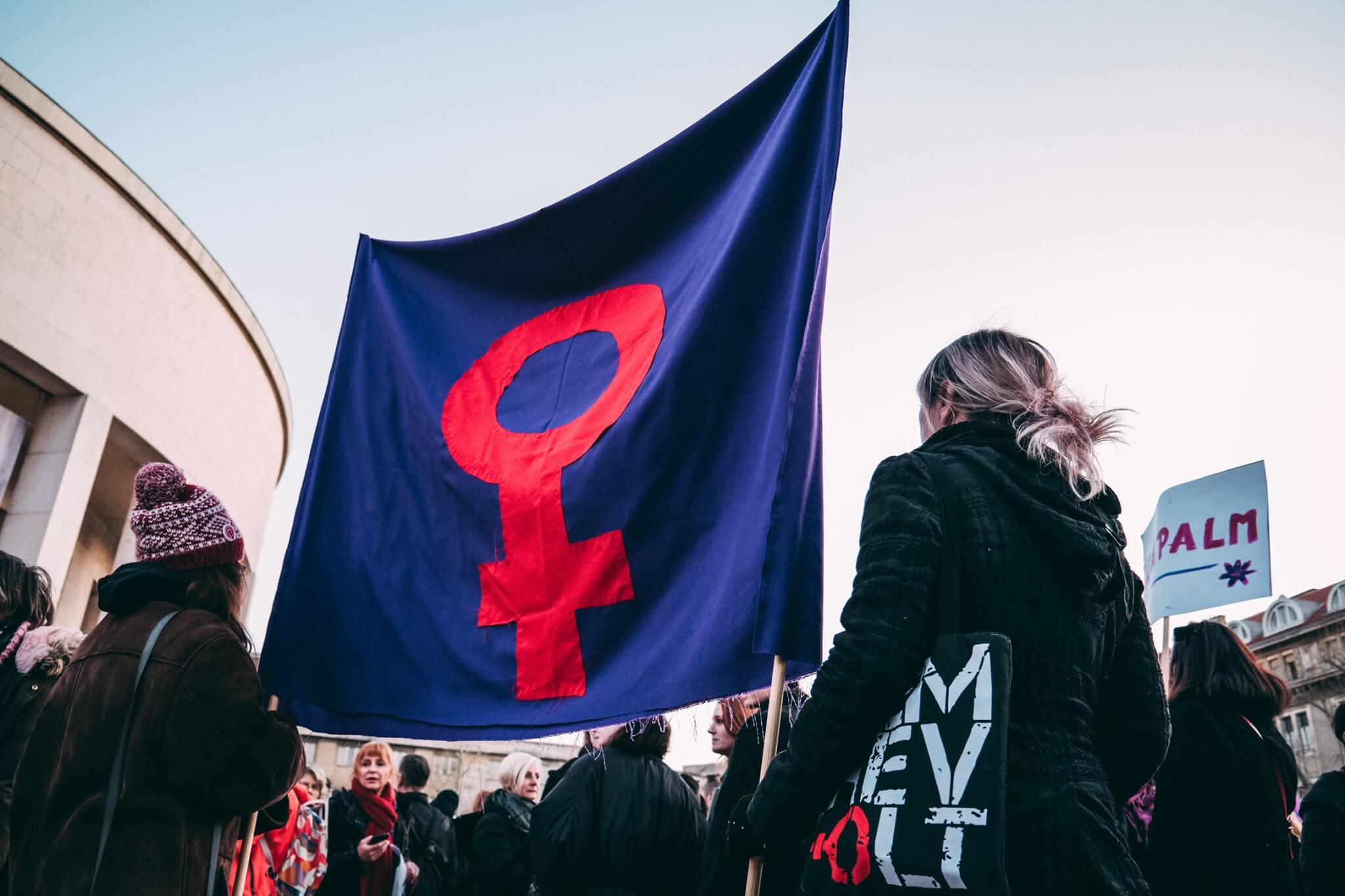
Noćni marš (Night March) 2020 © Lara Varat
A similar-to-me too-movement came about in Croatia and the Balkan region known as „Nisam tražila“ (I didn't ask for it) in 2021. Since Serbian actress, Milena Radulović, publicly accused her acting professor Miroslav Mika Alekšić of raping and abusing, similar accusations spawned on the acting academia in Zagreb and other faculties on the University of Zagreb and many more confessions from everyday people (mostly female but also male) experiences with sexual harassment, collecting 40,000 confessions in the first week from all over Serbia, Croatia, and Bosnia, and Herzegovina) on the „Nisam tražila“ Facebook page. Are you following this situation and what do you think about it?
Thanks to your question, I'm now definitely following it and trying to read as much as I can. As I noted in the question you asked me earlier about things I was surprised or shocked by, it was about how the #MeToo movement had not really taken off in Croatia as it did in the United States. I'm glad to see that there is visibility and acknowledgment of the sexual violence, abuse, and harassment of women in the Balkans. Sexual violence perpetrated by men in power needs to be seen and stopped.
What do these confessions both in the US and Croatia say about the acting community? What caused so much sexual blackmail in this particular field?
I don't think that the truths of sexual violence say anything about the acting community—what it does say is that those who have a public platform to acknowledge such abuse create visibility that those who are „ordinary citizens“ do not. People like Milena Radulović from Serbia and Alyssa Milano from the United States only magnify and make public the work of activists and community organizers. I don't know enough about activists in Serbia, but in the United States, it was activist Tarana Burke who first used the term „me too“ in 2006 and started the movement. #MeToo only went „viral“ in 2017 because of celebrity actions on social media. I feel it's very important to highlight the often invisible work of such activists. Blackmail only happens because the person in power knows they did something wrong and doesn't want the public to know about it because it might damage their reputation. Only those with enough influence, power, and money are privileged to use blackmail and one of those sectors is the acting community.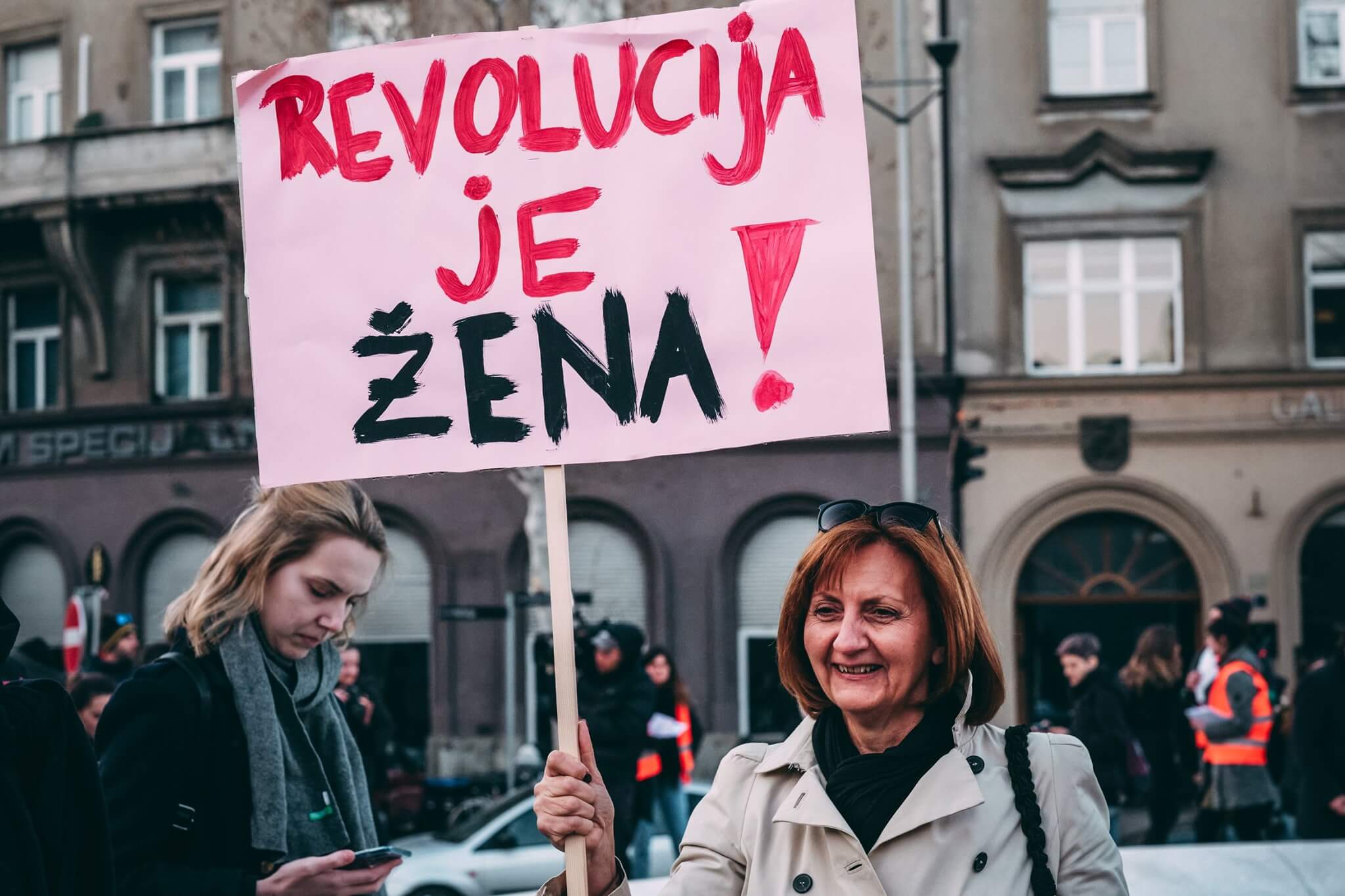
"Revolution is a woman", Noćni marš (Night March) 2020 © Lara Varat
„Laws are necessary but not sufficient“
Višnja Ljubičić, the Ombudswoman for gender equality demands changes in the law. As current law in Croatia allows legal prosecution up to three months since the event of sexual harassment occurred, Ljubičić asks for the law to increase for up to ten years. The law also states that sexual harassment is investigated only if the victim reports it and not ex officio, like for other sex crimes, which Ljubičić says also needs to change. How would you compare the current law in Croatia and Ljubičić's proposal to the law in the US? Is it stricter than Croatian and what changes did it go through throughout history?
I'm not a legal scholar and honestly, I find it quite confusing due to legal jargon and federal vs. state law. Federal law states that a person can have 180 days to report sex discrimination (sexual harassment is one type) in companies with more than 15 employees. In small workplaces (under 15 people), workers have no formal legal protection. Only seven states extend the time limit to more than 300 days. Finally, five states do not even have an office that enforces anti-discrimination cases. Others can report the sexual harassment for someone else, but there is no anonymity for the victim as the case must be investigated. Current time limits are similar between the countries. I am not familiar with the details of either country's laws (to say which is stricter), but what I can tell you is that visibility matters. As outlined in this article in Time magazine, the term „sexual harassment“ was not coined until 1975. But, the case that really made sexual harassment visible in the U.S. was Dr. Anita Hill's testimony against Supreme Court Nominee Clarence Thomas. As stated in the article: „Though Thomas denied the allegations and was eventually confirmed to the Supreme Court, Hill’s decision had immediate consequences: in its wake, sexual-harassment complaints filed with the Equal Employment Opportunity Commission doubled, and payouts from court settlements increased as well.“ However, it's important to note that when there is progress, there is also backlash.
Maja Mamula, a psychologist, and coordinator for „Ženska soba“ (Women's room), a non-profit organization for the prevention of sexual violence, suggests that due to the long period of the judicial process, institutions in which the accused is working should sanction and isolate themselves from the perpetrating suspect before the judges' ruling. She added that despite the „presumption of innocence until proved otherwise“ this is the minimum institutions should do even before the verdict. How would you comment on this proposition and how do people feel about this in the US as well? In your view, is there any possibility to ensure justice for the victim but also respecting the presumption of innocence? Should courts just be quicker or is there a more in-depth issue at stake?
„Is there a more in-depth issue at stake?“ is what's important from my perspective. It's highly problematic that we allow contact between individuals when a person's life is at stake due to violence. One should not have to request a restraining order (another legal step) to ask that an abuser not come near the victim. Legal protections only deal with laws and not the ethical or systemic inequities built into the system. For example, the legal system benefits those who have money, can access the internet, are English-speaking (in the U.S.), citizens, White, male, cisgender, etc.
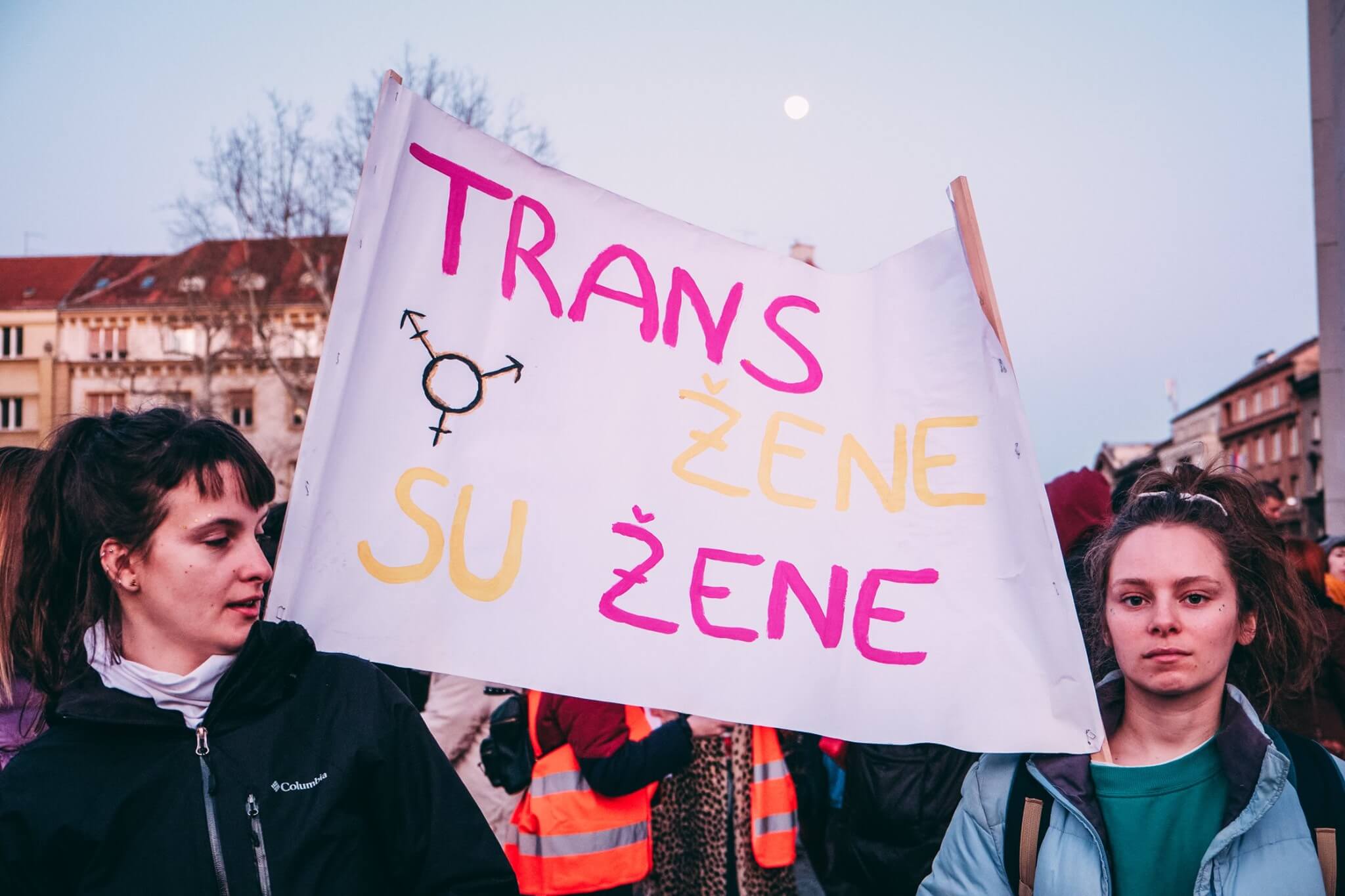
"Trans women are women", Noćni marš (Night March) 2020 © Lara Varat
Mamula also warns that the Council of Europe suggests that for 200,000 residents there should be one center for the prevention of sexual violence, but the Croatian government ignored the proposition to establish three new centres. What is the situation with such centers in the US, are they sufficient enough and if so, do they help society in supporting the victims and encouraging more reports of sexual violence?
The U.S. federal government has an Office on Violence Against Women that is part of the Department of Justice. The office does not provide direct aid or support to citizens but rather administers a grant program „designed to develop the nation's capacity to reduce domestic violence, dating violence, sexual assault, and stalking by strengthening services to victims and holding offenders accountable“. It's important to note that this office was created in 1995 after the Violence Against Women Act (VAWA) was enacted. Congress must reauthorize VAWA every five years and this has been done until 2019 when bipartisan support could not be obtained. Extending protections to vulnerable groups since 1994 has included indigenous populations, transgender individuals, and victims of human trafficking. VAWA does not currently protect girls at risk for female genital mutilation (FGM), immigrant populations, forced child marriage, or honor killings. To the best of my understanding, the lack of this Act not being reauthorized does not remove legal improvements made since 1994, but limits grant opportunities. Federal laws make a difference in reducing violence but there is no doubt the effects vary by state due to local regulations. In addition, there is little federal oversight in evaluating the effectiveness of grants provided to various organizations.
Whether these laws are sufficient is a good question. I do not believe they are. Laws are necessary but not sufficient. Laws do not necessarily address ethical issues or structural barriers that prevent equal access to protection. Justice cannot be accessed in marginalized groups that do not have financial or linguistic resources. They may also fear the legal system or simply have no idea how to access help. Even in trying to respond to your question, I had to do a lot of reading, searching, and understanding my own country's complicated laws—imagine being poor, an immigrant, or a member of a gender-minority group and trying to cope with the trauma of violence. Laws do nothing to mitigate unequal access.
Even when a woman has access and her case goes to court, her word is subject to victim-blaming—essentially an argument that she is personally responsible for her own victimhood (e.g., rape). Victim blaming is an example of something called the „fundamental attribution error“ (or correspondence bias) which is our tendency to blame individuals rather than the circumstances or situation. There are countless examples of citizens protesting victim-blaming in rape trials globally but it is still a tactic used in court to discredit a victim's story. Victim-blaming shifts responsibility away from the perpetrator. Activists and scholars say we are asking the wrong questions when it comes to sexual assault. The focus needs to shift from the victim to the abuser. For example, in the case of domestic violence, instead of asking „why does she stay?“, we should be asking „why does he hit her?“ In conjunction with laws to protect victims and hold perpetrators accountable, we absolutely must be addressing such biases and tactics within the legal system.
Another suggestion regarding the prevention of sexual harassment that is seeing bigger and bigger support in Croatia is introducing sex-ed in Croatian schools. This is something that ranges widely in the US as well. According to the Planned Parenthood website, there is a huge public support for Sex-Ed but „currently, 24 states and the District of Columbia mandate sex education and 34 states mandate HIV education“. What are and what do you think about CDC sexual components (are they sufficient or not) and do these 24 states and the district of Columbia record fewer numbers of sexual harassment and sex crimes than the US average due to sex-ed?
I'm glad to hear that sex education is gaining support in Croatia! Sex education varies widely by state. There have been changes since 2014 and they are critical to understanding what can and cannot be taught. Sex education in the U.S. is up to individual states to administer. If states want to get federally funding for programs, they can only teach „abstinence-only-until-marriage“ (AOUM) or „Sexual risk avoidance“ (SRA) programs (the name has changed over time). Essentially, these programs must adhere to eight strict guidelines requiring instructors to teach only about abstaining from sex unless one is married. They also teach that having sex outside of marriage is psychologically and physically harmful—this is not true. Abstinence-only programs don't work. In a study published in 2019 in the American Journal of Public Health, the authors show that abstinence-only sex education does not have an effect on teenage pregnancy; in fact, in conservative states, such programs have the opposite effect showing an increase in teenage pregnancy. In 2010, two small sources of federal funding were initiated that promoted sex education programs supported by evidence-based science (contraception, abstinence, sexually transmitted infections, and healthy relationships). These programs do work by lessening teenage pregnancies. Federally funded sex education is contentious and vacillates between support for programs reflecting religious values of abstinence-only and science-based interventions reflecting public health, particularly adolescent sexual health. Fortunately, there are other non-federally funded organizations like Planned Parenthood, the largest provider of sex education in the U.S. Their programs include topics like „communication skills, decision making, birth control, STIs, healthy relationships, consent, body image, anatomy, and puberty“.
In an editorial in the Journal of Youth Adolescence, the authors examine research from social and behavioral sciences in an effort to address more holistic sex education. They suggest that comprehensive sex education must also address gender and other structural inequalities. For example, the Centers for Disease Control (CDC) notes that risk factors for serious health outcomes are related to sexual behaviors and violence in LGBTQ+ adolescents more than their peers. As Croatian leaders and educators begin to think about sex education, I would urge them to base programs on „scientific input from a broad range of disciplines, including social, behavioral, medical, and public health sciences“ as these authors suggest.
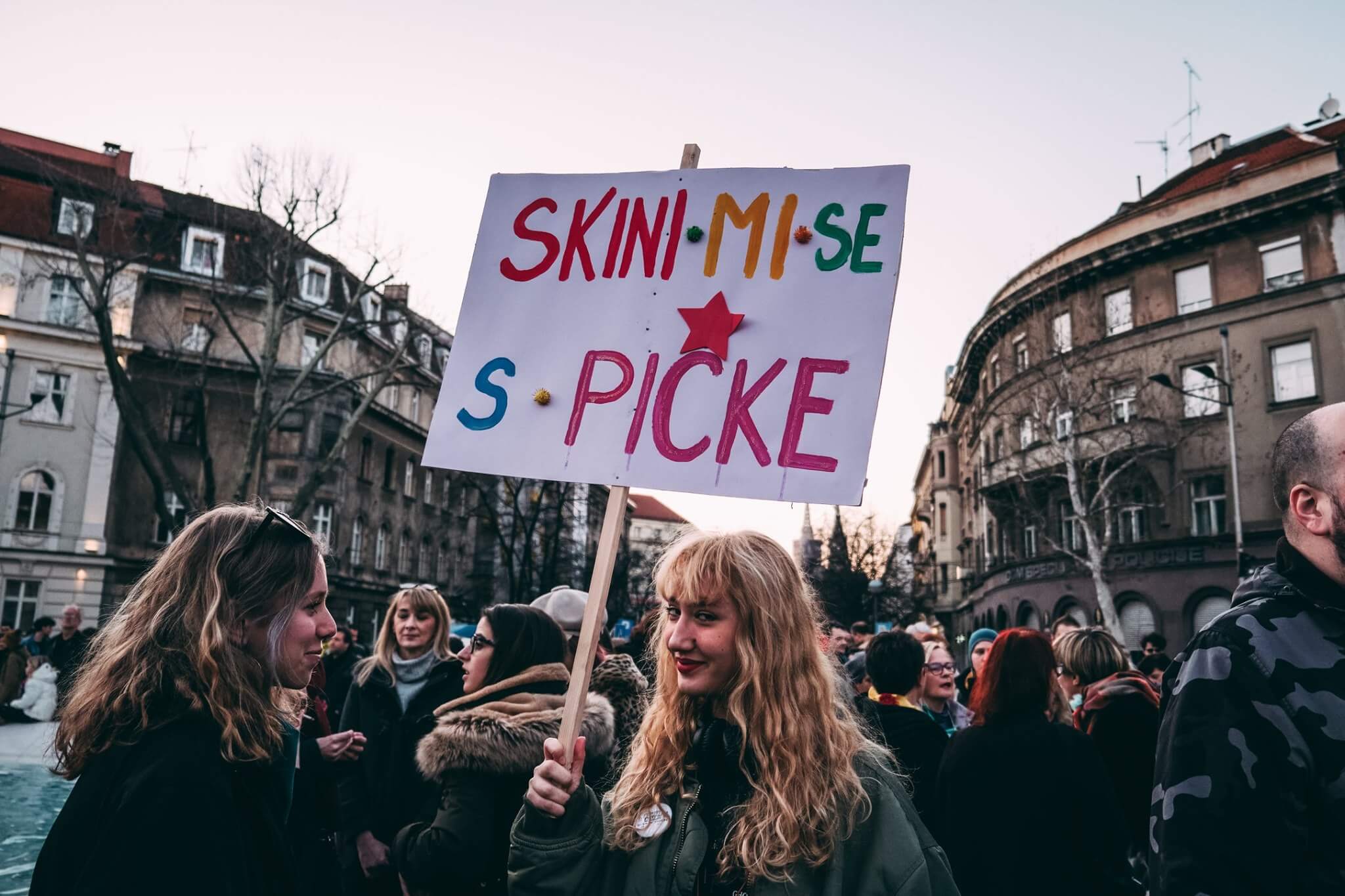
"Get off my pussy" Noćni marš (Night March) 2020 © Lara Varat
„Here in the U.S. is not much different“
Last year there was a quite gruesome verdict that caused quite a big controversy in Croatian public space. In the town of Čakovec in 2000, three 16-year-old boys were drinking in the afternoon in the bar in the company of a 16-year-old girl. After drinking they went to the family house of one of the boys and they raped her. The girl reported the crime after a week to the doctors who alerted the parents and the trial to the three boys began. The trial lasted for about 20 years. The girl has difficulties walking due to having cerebral paralysis as a child and the prosecutors charged the three boys for „forced multiple sexual intercourse with a person who is incapable of defense“. The experts, however, determined that the victim resisted the crime both verbally and psychically making the attackers clear that she didn't want to have intercourse. She was crying and pushing attackers away“. Due to the fact that the girl resisted and the charge was that it was a forced multiple sexual intercourse with a person who is incapable of defense, the three attackers were ruled as not guilty and clear of all charges. Additionally, the Ombudswoman for gender equality Višnja Ljubičić warned in Croatian media following the „Nisam tražila“ initiative, there are only a couple of guilty verdicts for perpetrators of sex crimes annually, and instead, these verdicts often go in favor of the perpetrators. What is the situation in the US? Does it also take such a long time for the court to give a verdict for sex crimes trials are prosecutors also making such mistakes, and does the US have any sort of a legal mechanism that prioritizes sex crime trials?
The case you describe in Čakovec is appalling but I'm afraid that the situation here in the U.S. is not much different—there are equally horrifying stories here. As you might imagine, the question of time for sex trials and judgments in favor of perpetrators is quite complex. However, I will share some findings outlined in this 222-page report. The authors note that attrition rates for sexual violence in the criminal justice system are substantial and „most victims never receive closure.“ It is already well-established that most cases are never reported. Those that are reported rarely end in arrest and even fewer go to a trial 1.6%. These data are corroborated by the Rape, Abuse & Incest National Network (RAINN). They report that perpetrators of sexual assault are the least likely to go to jail than all other types of crimes.
Sexual assault is based on control and power. Our governments, educational, legal, and other social systems need to acknowledge and address the sexist, racist, classist, ableist, homophobic, and other forms of discrimination inherent in them. Otherwise, laws will simply continue to exist on inequitable systems and perpetuate discrimination.
But overall, are these problems bigger in Croatia than in the US or other western countries? The maximum sentence in Croatia is 10 years for rape and up to two years for sexual harassment while the highest legal prison sentence in Croatia can be 40 years. Is this sufficient? What would be, in your opinion, the most sufficient prison time for these crimes?
Our focus on punishment keeps us locked in a system that perpetuates harm and does not allow for the possibility of structural change. Do I think that perpetrators should be held accountable for their actions? Yes, I do. However, prison does not necessarily deter people from committing crimes and recidivism is a problem. Instead, the focus should be on prison reform, restorative justice, and the prison industrial complex (PIC) that uses policing and imprisonment for social and economic problems. 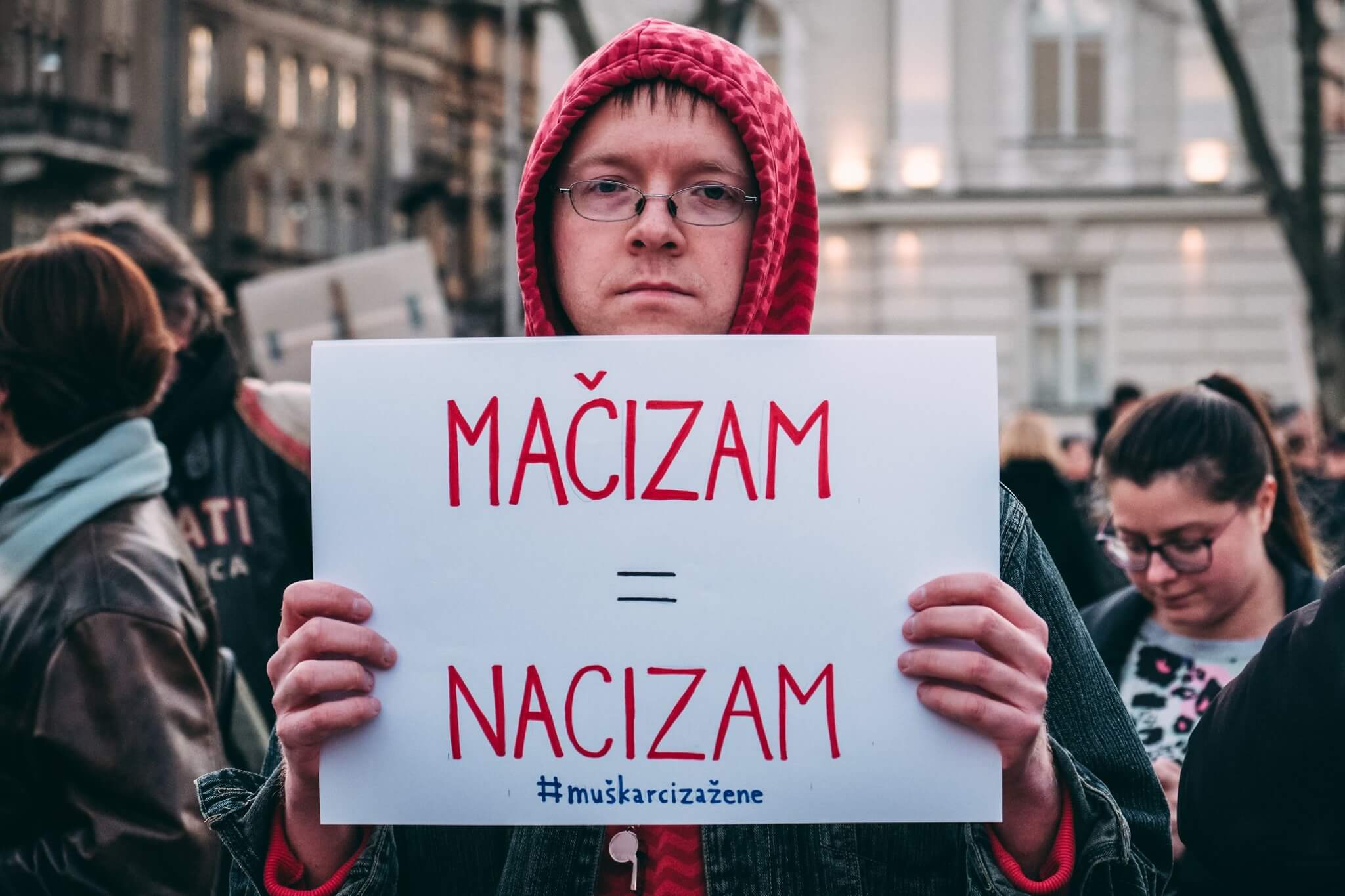
"Machoism = nacism #maleforwomen" Noćni marš (Night March) 2020 © Lara Varat
Equality vs tradition & faith
The majority of Croatians are proud of their traditional way of life and this tradition does play a huge role in the tourist promotion of Croatia that attracts visitors. But these traditions do come with a patriarchal structure and gender inequality as with other negativities that make the liberal stream roll-their eyes or down-right enrage them. Is it possible for Croatia to keep the traditions, its charm and yet create a society that does not discriminate on any level, including gender, religion, etc?
It's absolutely correct that certain traditions come with gender inequalities within a patriarchal system and Croatia is not alone in this. It reminds me of an essay („Chiefing in Cherokee“ reprinted in The Best American Travel Writing, 2017) by Stephanie Elizondo Griest I read prior to coming to Croatia for my sabbatical. She addresses this question of capitalizing on culture versus wondering if one's „touristic experience was authentic or not“. Tourists want „authenticity“ (tradition), but does it simply perpetuate discrimination based on harmful gender and other stereotypes? After all, tourism brings in money. I would like to answer this question based on one of many experiences I had in Croatia which I wrote about in my blog. I was grateful to be introduced to a tour guide who not only knows the history of Dubrovnik and Croatian tradition but can personalize her tours to include her knowledge of historically marginalized groups (the Jewish community, women, orphans, etc.) and how those forms of discrimination currently manifest themselves. I am not alone in wanting to be exposed to Croatia's charm but also how its complex history mingles with current forms of discrimination. I think that creating a society that does not discriminate is possible and acknowledging past injustices is part of that process.
You mention your Croatian roots and the catholic origin and how you even studied in a Jesuit school that is quite progressive. The biggest opposers to Sex-Ed in Croatia are conservative Catholic politicians and thinkers and some of them, without much success, are fighting for prohibiting the right to abortion in the country as well as limiting LGBTQ rights. Jesuits are not too popular in Croatia but what would you suggest, from a catholic position to the Croatian Catholics how to reconcile their faith with sexual education, LGBTQ rights, and women's reproductive rights?
When I was a child, I distinctly remember a lesson from catechism about baptism and limbo. I learned that if a baby were to die before being baptized, they could not go to heaven (baptism being a prerequisite after all). This bothered me...immensely. I questioned the doctrine—„do you mean that if a person in another country who isn't Catholic and has never even heard of baptism can't go to heaven even if they have been a good person?“ The answer, a firm „no“, made no sense and I was admonished for asking more questions. Of course, the Catholic church got rid of the notion of limbo some time ago, but the hypocrisies of my childhood religion were not lost on me. Although I did not have the language at the time, I was asking questions about privilege and the very foundations of systemic injustice. These answers weighed heavily on me as a child as I gravitated to the lessons of love and forgiveness.
I share this story because grappling with any belief structure, including one's religion, has been part of who I am. Reconciling one's faith with injustice is a personal journey and for me, doing the moral and right thing did not coincide with some tenents of the Catholic faith. I was not really allowed to question doctrine until I entered college and was exposed to Jesuit education that is rooted in service, justice, and love. I was taught to critically think about rather than accept doctrine. I write a bit about this in my blog in trying to understand Catholicism with the general lack of volunteering in Croatia.
The truth is there are conservative and progressive ideas that inhabit all social institutions—family, government, and religion. There is a Roman Catholic axiom, Imitatio Christi, which is loosely translated to a popular phrase that came into English usage in the 1990s, „What Would Jesus Do?“. If your answer to this question urges you to act with humility and compassion then perhaps there is room in Catholicism for inclusion and education (including sex education) based on teaching healthy relationships and nonviolence.
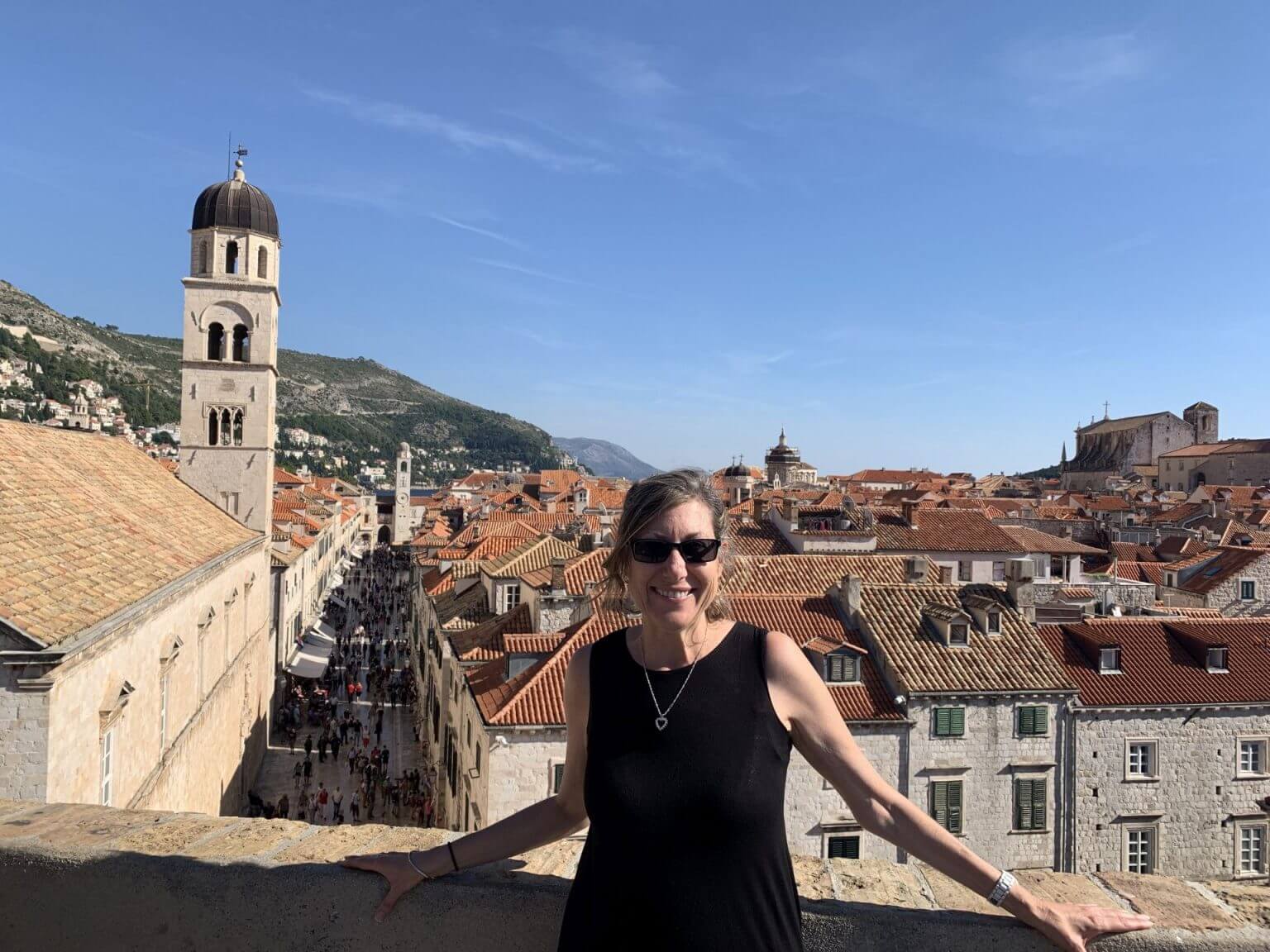
prof. Mala Matacin in Dubrovnik / private archive
To conclude, as someone coming from the US in the middle of getting Croatian citizenship, do you feel you will be more discriminated against in Croatia for your gender than in the US? Given your participation in "Noćni marš" and your knowledge do you think that as a Croatian citizen you could help improve the gender equality in the country both with your knowledge but also with experiences and background from the US?
It is my sincere hope that I will be able to get my Croatian citizenship! I met many people during my sabbatical who are doing important work to improve gender equality in Croatia and I would be honored if I could contribute to the ongoing efforts. I did not feel discriminated against based on my gender in professional realms in Croatia. In fact, a great majority of those doing gender-related work are women and I felt a kinship with them just as I do with those in the U.S. However, I know that women are discriminated against despite that it is not as overt as it once was (e.g., a woman not being given a job because of her sex). Research on implicit bias supports this.
Project Implicit is a non-profit organization founded by Harvard University in 1998. Implicit biases are deeply held attitudes and stereotypes about certain groups of people. „People can act on the basis of prejudice and stereotypes without intending to do so“. Despite the gains women have made globally, social science research supports that implicit biases are related to discrimination in complex ways. For example, a recent study showed that men are more likely to be seen as „brilliant“ than women across 79 countries globally. One of the authors states that "stereotypes that portray brilliance as a male trait are likely to hold women back across a wide range of prestigious careers".
It's not discrimination, but I noticed that my gender mattered differently in Croatia in terms of marital status and traveling alone. Initially, I was taken aback by questions about my marital status (for example, „where is your husband?“) or why I was in the country by myself. Such questions are not normally asked of me in the U.S., particularly among people who I meet in casual, public spaces. Yet, in Croatia they seemed natural and okay to ask—it felt unsettling to me.
For more about politics in Croatia, follow TCN's dedicated page.
Croatian Graduate Perspective: The View from Young Pilot Stjepan in Novska
March 7, 2021 – Asked whether he had ever considered moving out of Croatia, a young future pilot Stjepan in Novska said he would be lying if he said no. "After all, my profession's nature is such that it expects me to be a worldly man. But there were also thoughts of leaving based on the state of affairs in the state itself," says Stjepan in our Croatian Graduate Perspective series, and this is his story.
With many young people emigrating from Croatia, what keeps those who decided to stay (at least for now)?
The emigration of young people from Croatia in search of better business opportunities and living standards, unfortunately, is a well-known story. Each of us young people in Croatia knows at least a few people from their environment who, at one point, said that enough was enough and decided to seek happiness somewhere abroad.
According to official Eurostat data, from 2015 to 2019, Croatia's population decreased by 4.26 inhabitants per 1,000 citizens only thanks to emigration. Therefore, the Croatian emigration rate is the second-worst in the European Union (after Lithuania).
These data indicate that economic prosperity influences population decisions to emigrate. Besides, due to the exodus of the young and working population, there is an additional reduction in GDP per capita that closes the cycle of poverty and decline in Croatia.
However, there are many who are aware of the poor position of young people in Croatia but still do not want to give up and decide to stay in Croatia. We're wondering what do those young people, recent graduates, think about this whole situation and what are their reasons for staying in Croatia.
We continue our series with Stjepan from Novska, the most western Slavonian town.
First of all, please introduce yourself. What are you studying/what did you study? Do you have a job currently?
Hello, I am glad that you hosted me in this interview. It is a great honor to be part of a series of interviews where young people's voice is heard. My name is Stjepan, I currently live in Zagreb, and I am studying at the graduate study of aeronautics at the Faculty of Transport and Traffic Sciences in Zagreb. I am attending my last semester before I become a master's engineer in aeronautics. Along with college, I also completed civilian pilot training. I am not actively employed at the moment; I do some student work here and there.
What is it like being a student/recent graduate in Croatia during this coronavirus time?
Being a Croatian student during the coronavirus pandemic has become a bit more complicated. Although the faculty managed to organize almost all the exercises virtually, many projects do not hold precisely because of the coronavirus pandemic. Also, although students are not deprived of Erasmus programs and professional internships, they are deprived of the quality of the same. I believe that live and virtual internships are totally different. You can learn more by going to some of the institutions or companies within Europe.
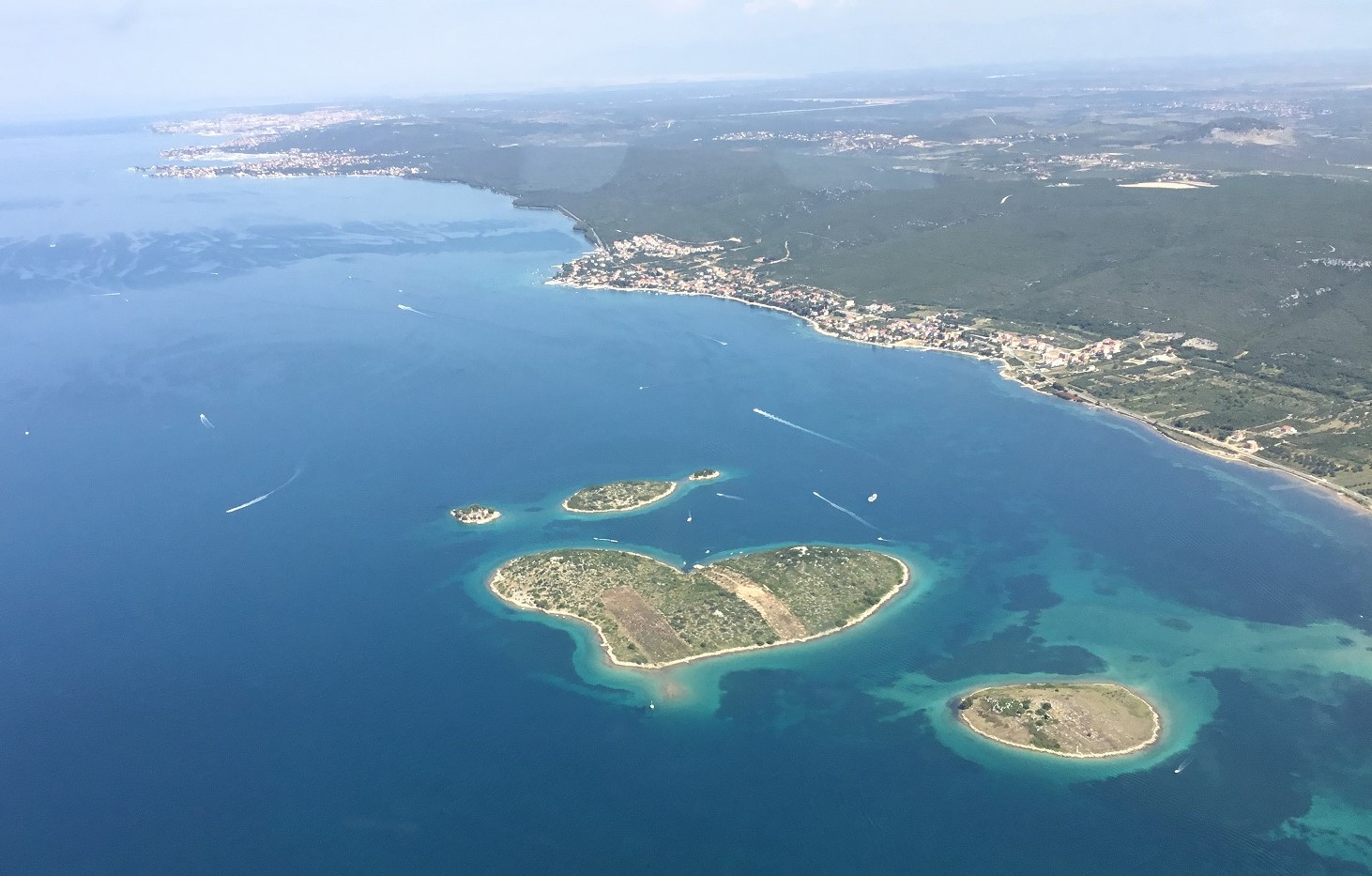
Heart-shaped Croatian island of Galešnjak - just one of many Croatian beautiful landscapes Stjepan sees during his flights
What are your experiences searching for a job in your profession in Croatia?
I have not yet started looking for a job in the profession. Still, listening to older colleagues' experiences, I can conclude that the aviation and air transport industry was booming until 2019 before the pandemic hit Europe. While now, the industry is practically still on its knees. Some experts predict that the industry will return to the old way only in 2024, but that depends on many factors involved in the story. I plan to graduate in the autumn of this year, so my hopes of finding a job in the profession right after graduating from college are very low.
What do you think of the Croatian Government's efforts to provide opportunities for graduates?
The Government is already helping enough because every state faculty in Croatia is free, and tuition fees for full-time students are financed from taxpayers' money. But, of course, it can always be better. Therefore, I also think that the Government should support entrepreneurs financially and develop various support programs to scout gifted students in the lower years of college to offer internships or employment on a student contract in their firms. Of course, taking into account the needs for future staff and that the employee is a student from the appropriate industry.
Many young people your age decide to emigrate from Croatia to find a better job opportunity and/or life standard. What do you think about it?
People have always emigrated from these areas for reasons and priorities known only to them. While I was finishing high school, emigrating abroad just became "in." Then I thought that only people who were less educated or could not make ends meet here in Croatia emigrated, or those who had completed schools for industries that practically and do not exist in Croatia today anymore. Later, it grew into a search for a state with a higher standard of living and reduced bureaucracy. While today, a growing share is made up of highly educated people. Worst of all, I'll probably be one of them one day too.
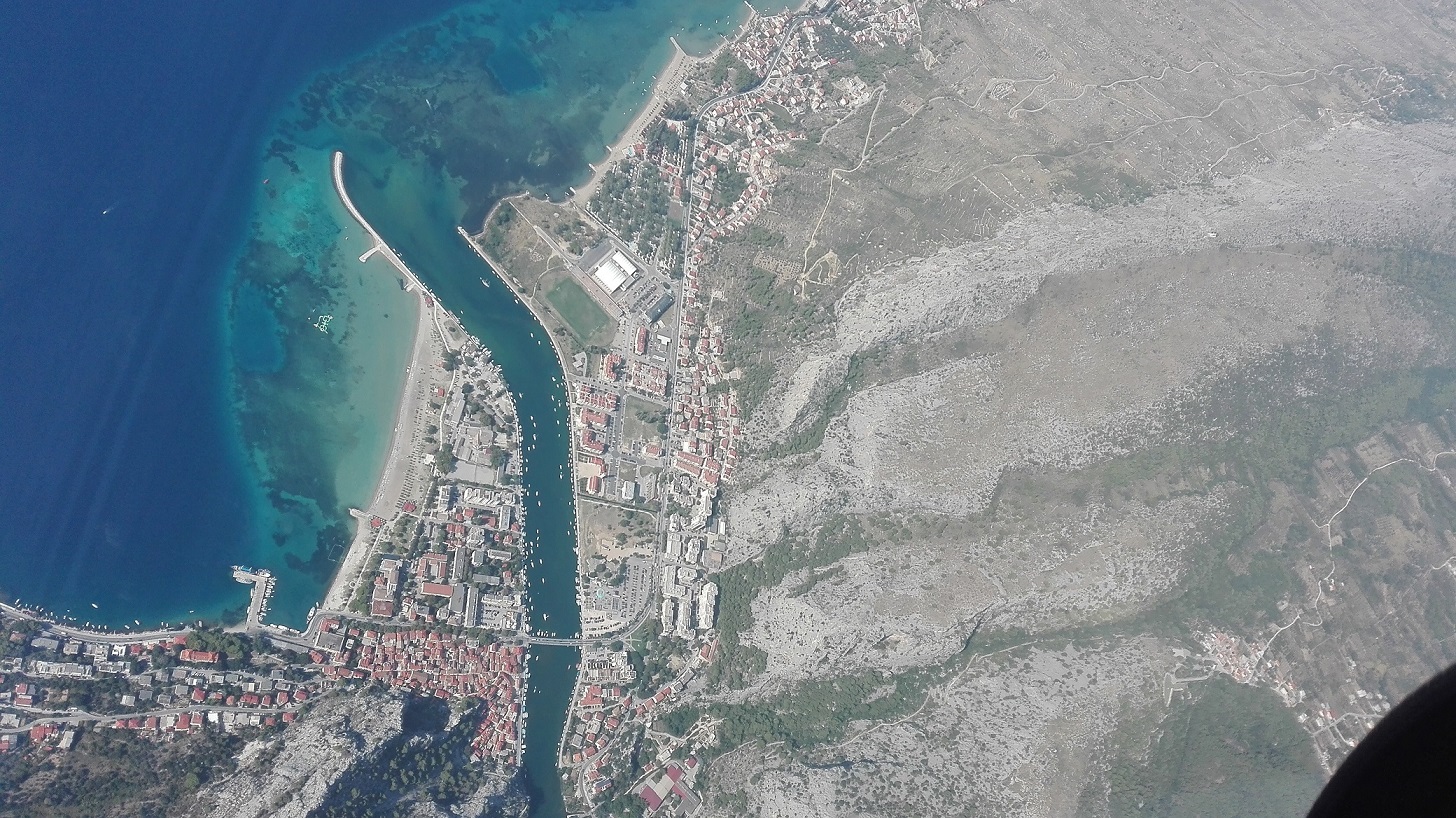
The confluence of the Cetina River and the Adriatic Sea in Omiš
In your opinion, what would encourage young people to stay in Croatia?
Reducing nepotism and corruption, better government and employment policies, lower taxes, attracting foreign capital or money from investment funds for project development or start-up industries. Also, the problem of young people in Croatia is solving the housing issue.
Have you ever considered moving out of Croatia and why?
Yes, I have. I would be lying if I said I haven't. After all, my profession's nature is such that it expects me to be a worldly man. But there were also thoughts of leaving based on the state of affairs in the state itself.
As a recent graduate, what is your impression of the education system in Croatia? What do you think is good about it and what could be better?
I think that Croatia's education system is good, and the grade I would give is 3 or 4, in between. I believe that some things are taught too broadly and that it is ok for primary school. However, in high school, it should be corrected. The compulsory subjects that everyone must have should be determined, and students should choose the rest according to their preferences or psychological tests. About college education, I believe it produces top professionals who can match the world. But unlike the world, too much remains on theory, and, as I mentioned earlier, more practice needs to be introduced.
Based on your own experience, can you say that everything is possible in Croatia if you work hard, work on yourself, are educated and ambitious?
This quote may sound cynical and worn out, but I would like to quote Sylvester Stallone from the Rocky Balboa movie: "It's not about how hard you hit. It's about how hard you can get hit and keep moving forward. How much you can take and keep moving forward."
And I think that quote is valid, especially for Croatia. The only problem is that they never stop "hitting" you here, hahaha. But, yes, if someone has a strong enough motive, they can finish whatever they want. But whether he will succeed and find or get the desired job in the profession or a job in the profession in general, that is the story for another interview.

Stjepan says the aviation and air transport industry is on its knees now, making it uncertain for him to find a job
If you could change only one thing in Croatia, what would it be, and why do you think it's important?
That Croatia ceases to be just a country for a good vacation but to become much more than that. Those who read this sentence with understanding will understand the message.
As a young Croatian, what are you most proud of in Croatia?
I am most proud of the country's natural beauty and the people. I had the opportunity to travel throughout Europe, and I have never met people like us. Ready to help a stranger on the street, most people speak a foreign language or at least try to express it. Oh yes, and unity. The unity of my people when it matters and when people need help. That's usually that short period when we don't quarrel with each other to the point of blood about politics, haha.
Are you optimistic or pessimistic about the future of Croatia, and will it be a better or worse place for your children?
I would say I am optimistic. The situation is bad, and I don't know if it will change soon. I believe that you should always go forward and do good in life, and I think that not much can be achieved by going back and pointing fingers.
Also, I believe that a great unity of the people is needed, which is currently undermined by distrust in this country's governing structures. That distrust has fallen on fertile ground and is flooded every day with a new number of people who sat in a vehicle and left their homeland forever.
And about the future when I'll have children, it will be good for them only if I create the necessary conditions for that. That is why I believe that it is our responsibility to create a better future.

Are you a student or recent graduate who would like to contribute your voice and experiences to this series? If yes, please contact This email address is being protected from spambots. You need JavaScript enabled to view it. with the subject "Graduate."
To read more from the Croatian Graduate Perspective series, follow TCN's dedicated page.
Croatia Covid Passport Support Will Happen Only in One Case
March the 7th, 2021 - When it comes to the controversial issue of Covid passports, first discussed at any serious level by Greece in its active attempts to see tourism return to its shores, there hasn´t been much said by Croatia. In fact, Croatia Covid passport support will only happen in one situation.
As Poslovni Dnevnik writes, Croatia Covid passport support at the EU level will only exist if such a travel document is not mandatory, Jutarnji list wrote on Sunday, citing an anonymous, well-informed source who said that crossing borders without restrictions should be allowed for those who present a negative coronavirus test result or their vaccination certificate.
After European Commission President Ursula von der Leyen announced this week that they were considering the introduction of a "Digital Green Certificate" for easier border crossings, it became clear that a common solution was being sought at the European Union level to restart passenger traffic between countries. The Commission's final proposal on what the certificate should look like and how passengers will use it should be completed by March the 17th, but the story so far is accompanied by a series of ambiguities and even a fundamental misunderstanding of what the certificate should represent.
According to Politico, which received access to Ursula von der Leyen's letter on the certificate, the European Commission advocates that the certificate not only be proof that passengers have been vaccinated, but also that it combines negative PCR test results in one place, as well as confirmation that the passenger is immune to the virus following their contraction of it and their subsequent recovery from it.
For the introduction of the official certificate, at least according to Politico, mainly tourism dependent countries are in full favour of the document. Spain, Malta, Cyprus and Greece, as well as Cyprus, have all already announced that they plan to start allowing vaccinated Britons into the country without the need for any restrictions, while Cyprus and Greece have come to a very similar agreement reached with Israel, which has done excellently in terms of vaccination of the general population.
However, some other countries are also inclined to introduce this document, and this initiative was welcomed last week by Austrian Chancellor Sebastian Kurz, while Croatia, although dependent on tourism, has so far only very shyly responded to this burning topic.
As Jutarnji list has learned from a well-informed source, Croatian politics generally supports all efforts that will result in easier border crossings, but only if it will not be discriminatory towards citizens.
Although it is unclear what the certificate itself should look like, it is currently being discussed that it will actually be in the form of an app on a smartphone in which the traveller will have their negative test results, their certificate of vaccination or proof of having recovered from the novel disease.
In that sense, Croatia Covid passport support would only occur if it would not be made obligatory for passengers, ie if those who do not have a certificate, but can present their negative test result or their vaccination certificate in some other form would also be allowed to cross borders without facing restrictions, reports Jutarnji list.
For the latest travel info, bookmark our main travel info article, which is updated daily.
Read the Croatian Travel Update in your language - now available in 24 languages.
Americans in Croatia: From Short Hvar Stay to Digital Nomad Visa Success
March 7, 2021 - Americans in Croatia are very welcome guests, and many would come for long if it was possible. It is now, if you are a remote worker. Meet Jessica Romano from San Francisco, officially the first approved digital nomad on Hvar. Congrats and welcome!
"As you probably know, Paul, Americans in Croatia can only stay for a limited time. We LOVE Jelsa, and your apartment is really great, and we would rent it through the winter if we could stay. I read on TCN about this digital nomad visa? Is it coming soon? Do you think I could get one?"
Americans in Croatia - from a temporary stay in Jelsa to a 12-month permit.
That was back in early November when Jess and Thibaud rented our Panorama Penthouse Jelsa apartment for a couple of months. Some nice and unexpected income so late in the year. And there would be more rental income out of season if they were allowed to stay longer. Currently, Americans in Croatia can only stay 90 days at one time.
So there we were, in a situation where we both wanted to engage with Croatian bureaucracy (my favourite hobby) to get a result for Jess. She and Thibaud are amazingly thoughtful and respectful guests, even baking cookies for my punica, which makes me a little bit cooler in my punica's eyes by association.
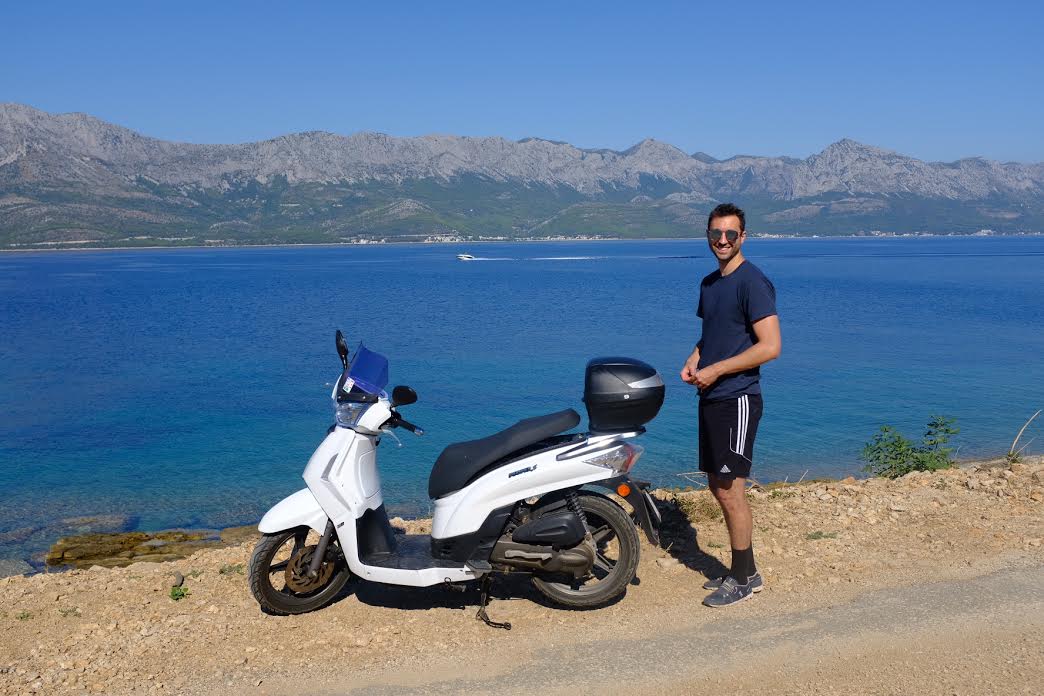
I helped where I could, as did several others. It seems that Jess and Thibaud have been a hit in the Jelsa community, helping several people, as well as bringing a little colour and fresh perspective to the long Dalmatian winter.
And yesterday, some great news, as Jess informed me that she heard back from the authorities at MUP and has been approved for a 12-month stay.
Great news and congrats. Jess kindly took the time to tell me more about, winter in Jelsa, and what the visa means for her.
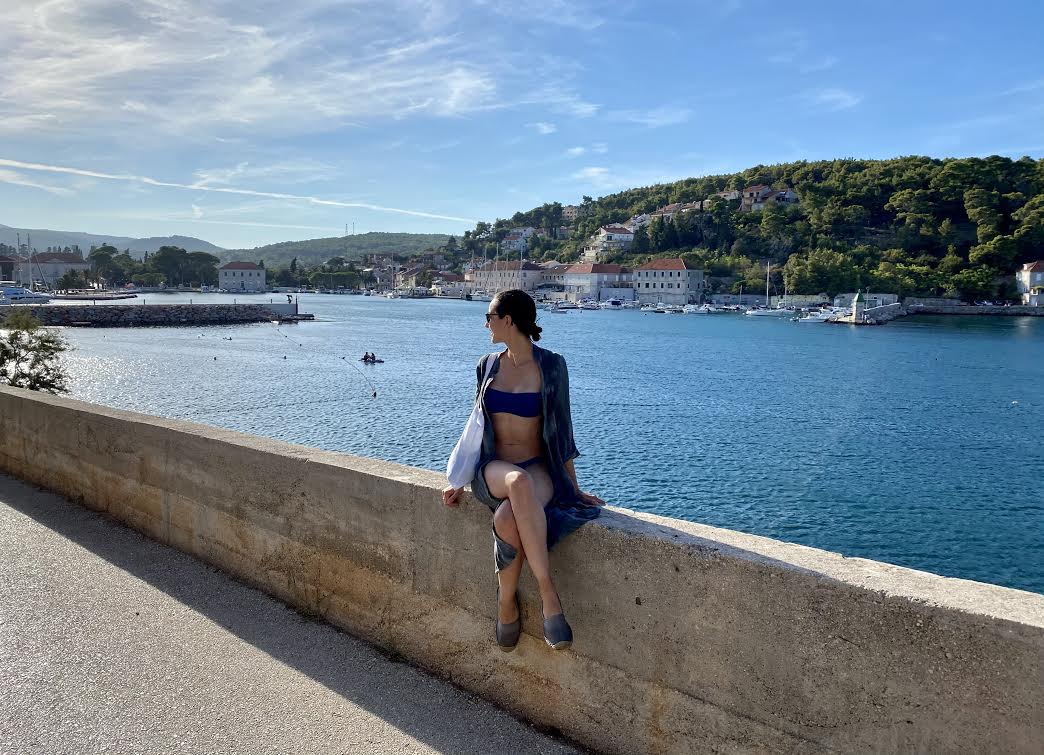
Firstly, how are you enjoying winter on Hvar? Has the reality been a little different to what you were expecting? In what way?
I’ve been enjoying it - Hvar is beautiful year-round! I didn’t have many expectations heading into the season, especially as Covid-19 dragged on into 2021. Due to pandemic restrictions, most restaurants and cafes were closed, and people haven’t been out very much. Since this is my first winter season on the island, I don’t have a point of comparison; generally, the slow pace and absence of crowds has been great. The weather and temperature has been mostly mild, but I was surprised by 1-2 week-long rainy stints. We are familiar with jugo and bura by now. I told friends here that I’ve felt quite tired during jugo, and they said that I’m officially a local now. Alas, those cloudy periods make the sunny days even more wonderful. It can get quite warm when the sun is out - if you haven’t looked at the calendar, you might think it’s summer at times! I’ve spent a lot of time outdoors - hiking, walking, rock climbing & running - and recently bought a car to explore the island. I feel as though you could live on Hvar for years and not discover all of the unique villages, ruins, beaches and trails here. Even though most wineries are closed in the winter, some offer tastings by appointment, and I’ve stopped by local producers to pick up bottles to enjoy at home.
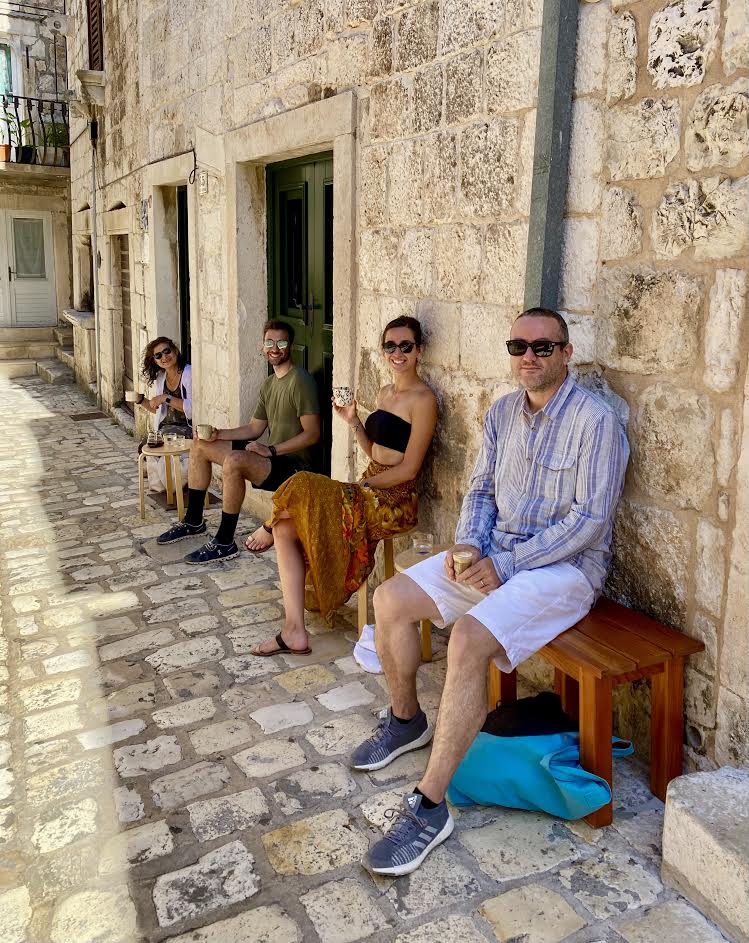
You recently became a TV celebrity - tell us about that experience. You did a great job promoting the digital nomad lifestyle to a domestic audience. I think a lot more people here now understand it better.
Who thought we’d ever be on Croatian TV?! Wow, what a fun experience. We were delighted when the Puls team reached out to feature us in their digital nomad series, and were especially excited to share our positive experiences in Croatia. We shot the film over a few days - at our apartment, in Jelsa & Hvar town, and near Zavala. Filming the reportage is a lovely memory for us, as was spending time with the producers, Maja and Jura. They are a joy to work with and made us feel very comfortable in front of the camera. The reportage captured moments of our everyday life. It also showed that digital nomads can benefit from living in Croatia and that likewise, Croatia can benefit from digital nomads integrating into the community. We are so grateful to the people of Hvar (and Croatia, as a country) for embracing us.
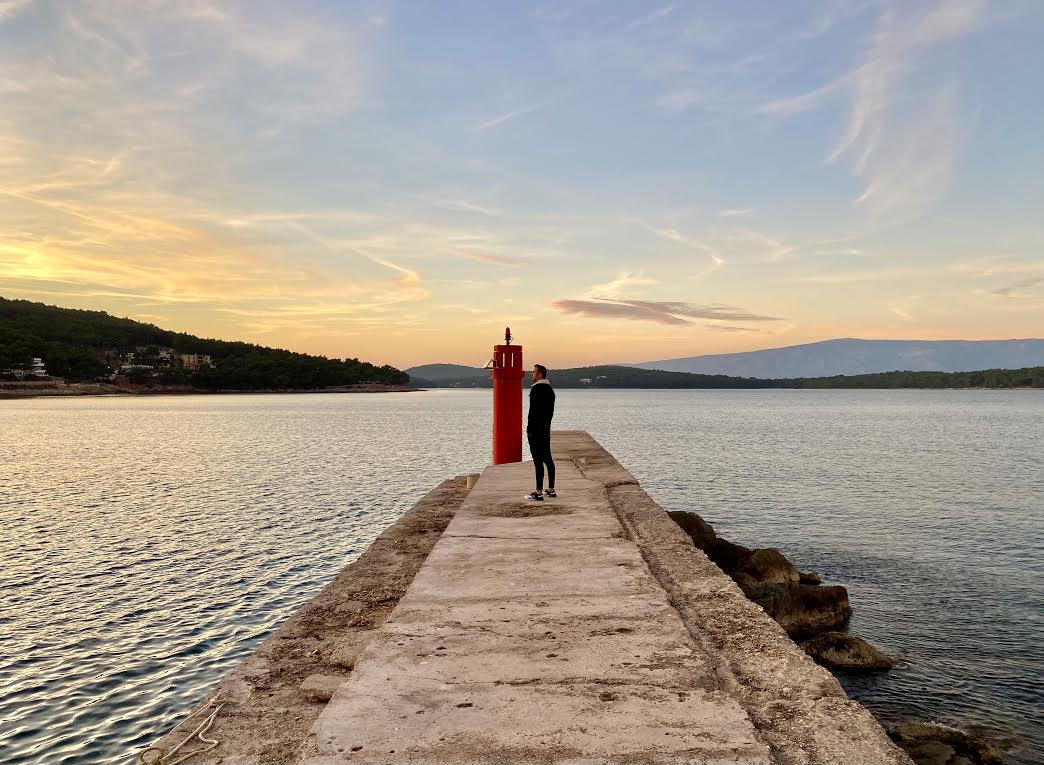
An American on Hvar. That can only happen for a finite length of time, normally, but you had good news come recently - your application for the digital nomad visa has been approved. Congrats! Tell us more.
Puno hvala! It’s exciting to be one of the first people to receive approval for Croatia’s new digital nomad visa. It is rather incredible that Croatia created and approved the digital nomad visa in such a short period of time.
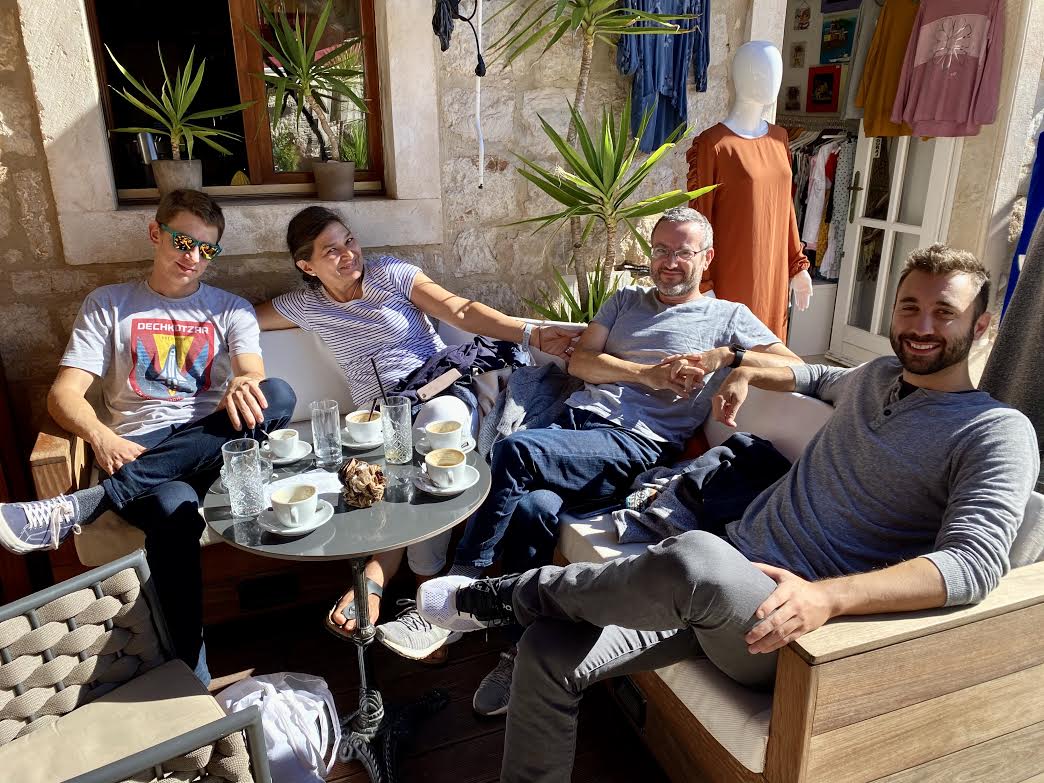
Tell us about the process and what you needed exactly?
Since I had already obtained a temporary residence permit and some of the requirements overlap, the change was relatively simple. I applied shortly after the visa was announced in January and submitted my paperwork through the Hvar police station. Shout out to Ivana for helping us through the process! The digital nomad visa is new for everyone, the MUP and applicants alike, so it felt like we were all learning together. I provided proof of employment (on official company letterhead), proof of health insurance (foreign and travel), proof of income (pay stubs), the completed application form, a copy of my passport and a small photo for the ID. I paid a fee - if I recall correctly, it was 600kn plus 70kn in stamps. I signed a document to request the revocation of my temporary residence permit in order to apply for the new visa. The MUP provided me with a document stating that I was legally in Croatia while ‘between’ visas. The whole process took 4-6 weeks. Big thanks to all of our friends and acquaintances who advised me through the process, including you(!) and Jan de Jong.
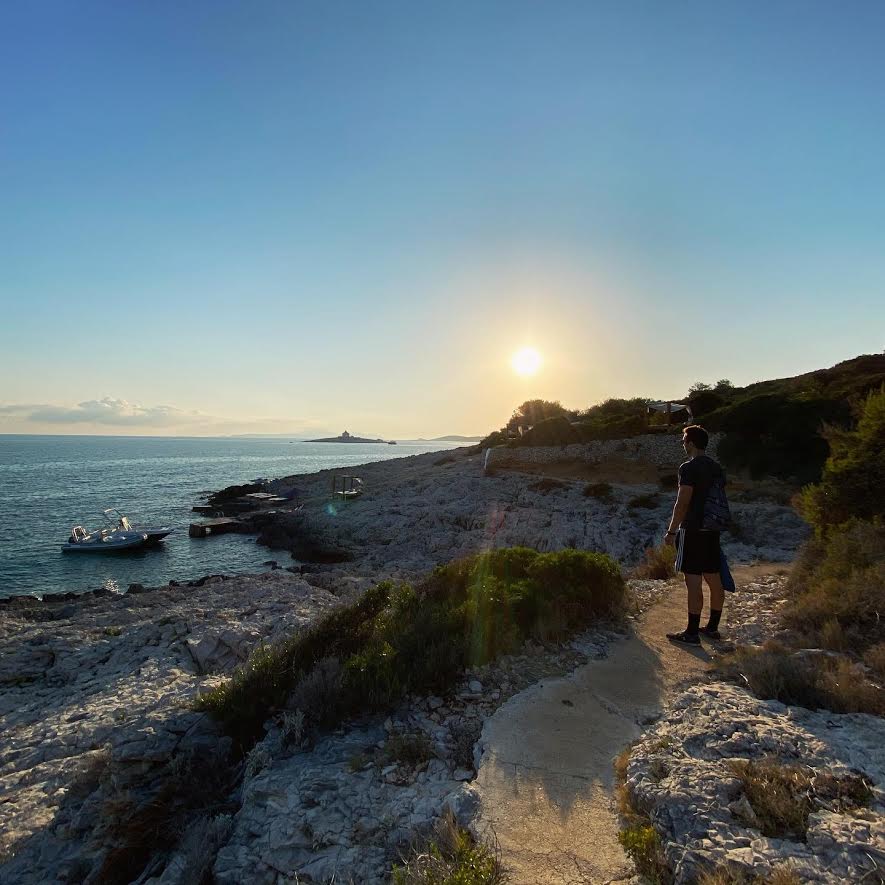
What exactly does it mean for you and your lifestyle to now be able to stay in Croatia for 12 months?
Being able to stay in Croatia for an extended period of time means two big things for me. Firstly, I have more options on the table regarding where I want to live and work. Secondly, it actually provides some stability as we all enter a post-pandemic world. Like many people, my life shifted in 2020 - there were circumstances I couldn’t control but there were choices I could control. One of those choices was to relocate to Europe. My original intent was to stay for a few months and then travel around the continent but I wanted to stay in Croatia. After my tourist visa expired after 90 days, I applied for and was granted a temporary residence permit. The digital nomad visa provides a longer-term solution for staying in Croatia and removes the stress and uncertainty of having to re-apply for extended temporary residence. Now I don’t have to worry about leaving Croatia for a year and can focus on my life and work here. Something I didn’t fully realize before landing in Croatia is that it takes several months to settle into a new place. Getting comfortable with the environment, people, way of life - it all takes time. Having the option to stay for a year gives me the opportunity to more deeply explore the culture and what it would be like to live in Croatia long-term. I wouldn’t be surprised if other digital nomads choose to lay down roots in Croatia - either through starting businesses, buying property or becoming part of the community - because they have the chance to spend sufficient time here before making those decisions.
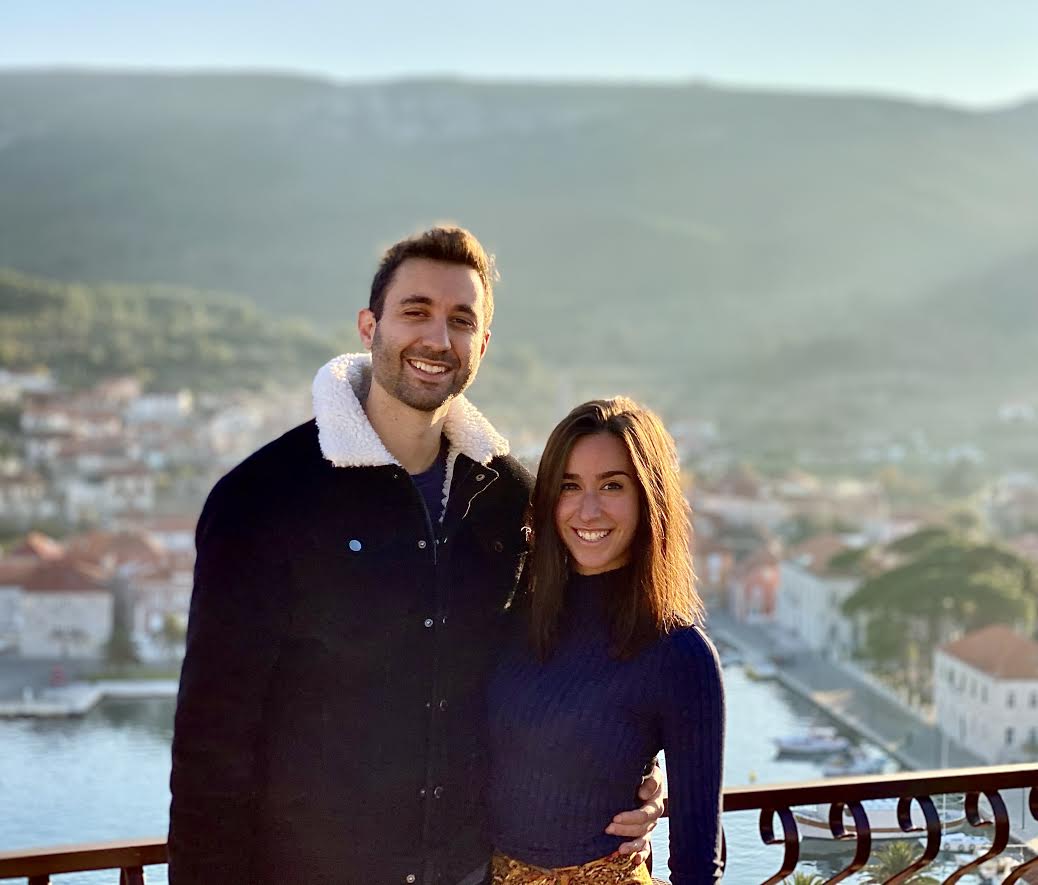
What message do you have for fellow international remote workers about life in Croatia off-season. What are the pros and cons?
Croatia is an excellent option for digital nomads all year-round. It’s worth noting that my perspective is based on spending the majority of my time on Hvar - which is a place that I’ve grown to love and can recommend highly! But from what I know, there are many awesome destinations within the country, and there’s somewhere for everyone. Big cities, tiny villages, and everything in between - as well as over 1000 islands (though not all of them are inhabitable). The landscape varies vastly across the country, from mountains to farmland to (a very long) coastline. I was slightly concerned about being able to find a high-speed internet connection, but it’s not been a problem. Most Croatians I’ve met are willing to speak English, so there is no language barrier in terms of being able to get around and communicate generally. Every location has its perks and quirks - as long as you are determined and have an open mind, you’ll be able to make it work. There’s heightened energy and tangible efforts around making Croatia a premier destination for digital nomads, making it a great place to be right now.
Here is the great feature on Jess and Thibaud which aired on Croatian primetime TV on HRT Puls.
If you want to learn more about their story, they gave a great interview on TCN back in December, when the digital nomad opportunity was still not officially in place. Read Digital Nomad Life in Croatia: Jess and Thibaud, from San Francisco to Jelsa.
That means that there are now at least two Americans in Croatia with the digital nomad visa. Meet the first-ever recipient of the visa - Meet Melissa Paul, Owner of Croatia's First Digital Nomad Visa.
Are you a digital nomad who would like to spend 4 weeks as a guest of the City of Dubrovnik? Learn more in Dubrovnik Launches World's First Digital Nomad-in-Residence Competition.
For the latest news and features about digital nomads in Croatia, follow the dedicated TCN section.
How many Americans in Croatia are there? We are looking to do a series on Americans in Croatia, so if you are here and would like to be featured, please contact This email address is being protected from spambots. You need JavaScript enabled to view it. Subject Americans in Croatia.
Pupovac Says Church Broken into for Gain, Not on Ethnic Grounds
ZAGREB, 6 March, 2021 - Serb National Council president Milorad Pupovac on Saturday visited a Serbian Orthodox Church in Šibenik which was robbed the night before, saying he was confident it was not done to hurt Orthodox believers but for gain.
An unknown perpetrator broke into the church and took about HRK 100 in donations, county police said, while the Eparchy of Dalmatia said that major damage was caused.
MPs Pupovac and Anja Šimpraga visited the church and the local Orthodox cemetery, "one of the most significant in Dalmatia," according to Pupovac.
"We decided to come to show that nobody should have fear or wrong ideas about the event which took place here... From everything we heard, this was an act of vandalism," Pupovac said.
We are deeply confident that this wasn't done on religious or ethnic grounds, but by unfortunate people who evidently don't receive enough care from those who should care for them, he added.
"We wish to raise awareness in people that they can be proud of this religious and cultural site," Pupovac said, adding that the cemetery "should be protected so that it isn't vandalised again in any way.
Šimpraga concurred that this was an act of vandalism. "It's people who are not accepted in society the way they should be."
"Both Catholics and Orthodox believers come here. We are here to tell vandals not to come and destroy something that someone respects and considers sacred. Neither ethnicity nor faith is important. We must primarily be human and do our best to live better in this city, county and republic. We are sending a message of peace... and wish to establish some new values which have been lost in all these years", she said.
SDP Candidate for Dubrovnik Mayor Turns Himself in after Threatening Neighbour
ZAGREB, 7, March 2021 - Local media said on Saturday the Social Democratic Party's candidate for mayor of Dubrovnik, Jadran Barač, turned himself in to the police this afternoon after threatening a neighbour.
After Barač, the neighbour arrived at the local police station as well and pressed charges against him for making threats.
Local media said the two had been in disagreement over neighbour relations for years and that after being interviewed by the police, Barač would be taken into custody.
The police confirmed that a 37-year-old man was charged with making threats, which is punishable with up to three years in prison.
Zdenko Adrovic: Banks Hope Companies Won´t Require Moratorium Extensions
March the 7th, 2021 - The ongoing coronavirus crisis is difficult to manage even for banks as Croatian companies require moratoriums on loans and credit taken out. As the tourist season approaches, Zdenko Adrovic, the director of the Croatian Banking Association, says that banks are quietly hoping that such extensions will become a thing of the past.
As Novac/Marina Klepo writes, with the beginning of the tourist season, when Croatian companies working in the field of tourism and transport start generating income, the Croatian Banking Association believes that their creditworthiness will increase and that there will be no additional need for moratoriums.
Referring to the latest guidelines of the EBA, the EU banking regulatory body, on extending the moratorium to nine months, Zdenko Adrovic, the director of the Croatian Banking Association, stated that an expiration to that will take place on March the 31st this year, which means that the moratorium may last until the end of 2021.
¨I believe that this should be long enough, provided that everything starts to return to normal in the next few months,¨ said Zdenko Adrovic during a presentation. However, he added that he will have a much better picture of the state of Croatian companies and what happened in regard to the economy at the end of June. Whether the moratorium will be extended, obviously, will depend on further instructions from the EBA, but what is quite likely is that the share of so-called bad loans/credit will continue to grow, as well as banks' provisions for value adjustments.
The importance of support
The year of the coronavirus crisis in regard to the banking system, according to Zdenko Adrovic of the Croatian Banking Association, will be remembered for three characteristic trends: the growth of deposits, stable interest rates and the growth of loans. Back in January this year, household deposits were seven percent higher than they were in the same month last year, and compared to the end of 2019, they increased by as much as 15.6 billion kuna.
Profit and capitalisation
As expected, the public health crisis led to a deterioration in overall bank performance, with their profits more than halved last year (down 53.3 percent). Their net interest income decreased by 5.7 percent, and income from fees and commissions down by 10.5 percent. Banks responded to the decline in income with better cost management, but "costs are more rigid than income and cannot be reduced at the same pace." Despite this, Croatian banks remain "among the best capitalised banks in the world". The total capital ratio of 24.9 percent and the entry into the banking union in parallel with the entry into ERM II "guarantees stability, transition through the crisis and the readiness of banks to respond to the increased demand expected by offering new loans in the period ahead as we exit this crisis.¨
Drop in Croatian Private Rental Numbers as Result of Coronavirus Pandemic
March the 7th, 2021 - The number of Croatian private rental owners has seen a decrease as a result of the ongoing coronavirus pandemic and the stringent leisure travel restrictions that have come with it. Their Association is seeking measures to ease things for those in this business.
As Novac/Jozo Vrdoljak writes, in Split-Dalmatia County, the number of Croatian private rental owners decreased by as much as 11 percent, and in the City of Split itself, by almost 15 percent. This information was presented at the online session of the Family Tourism Association Section of the Croatian Chamber of Commerce - Split County Chamber.
Gordana Pitesa stated that a safe epidemiological environment is a prerequisite for the arrival of guests from abroad, and as such she recommended the Safe Stay in Croatia label to all stakeholders in tourism, which can be absolutely crucial for guests when choosing a place to stay.
At the moment, there are only a small number of reservations, said Pitsa, recommending that Croatian private rental owners place more emphasis on making sales and being more present on social media.
"A lot of work has been done by the national family tourism board, some of our proposals have been met and the importance of the board is that on the one hand it allows us to communicate with ministries and relevant institutions, and on the other gives Croatian private rental owners the opportunity to propose more measures and things in regard to doing business easier and better for them,¨ said the president of the Family Tourism Association of the Croatian Chamber of Commerce, Martina Nimac Kalcina.
Nimac Kalcina reminded Croatian private rental owners of the proposals of measures to facilitate the business of private landlords that were sent to the relevant ministry at the end of February, such as the exemption from paying the first installment of the annual flat income tax private landlords must pay which due on March the 31st this year, the exemption from paying tourist tax and other such membership fees for the year 2021 for all those who deregister their accommodation capacities, provided that they did not have registered guests, accessing loans and more.
The session also discussed the need to organise additional coronavirus testing points for visitors, the need to speed up testing, the setting of a far more appropriate price for PCR tests for guests and the better facilitiation of the procedure, which they will continue to insist on because such things will govern tourists´ decision making when it comes to where to go and where to stay. The possibility of putting the categorisation process on hold, for example, for one year, was also discussed.
For the latest travel info, bookmark our main travel info article, which is updated daily.
Read the Croatian Travel Update in your language - now available in 24 languages.
Mayoral Candidate Miroslav Škoro Promises Free Zagreb Kindergartens, Closure of Jakuševac Landfill
ZAGREB, 6 March, 2021 - The Homeland Movement (DP) leader, Miroslav Škoro, on Saturday presented his agenda as a mayoral candidate in the Croatian capital city of Zagreb, and on that occasion he said if elected, he would provide free-of-charge services in the city's kindergartens as of this autumn.
"I assure you that the Jakuševac landfill will be closed and that waste management will be improved," Škoro said in Zagreb's Cvjetni Trg Square.
He also promised the construction of a state-of-the-art hospital and of a national stadium which could maybe named after the late footballer Zlatko Cici Kranjčar.
One of Škoro's promises is the reduction of the city surcharge by three percentage points.
"One epoch is over and it is high time we introduced a new model of managing Zagreb in accordance with the needs of its residents and the 21st century," said Škoro, who confirmed speculations that he would run for the Zagreb mayor a few days after the funeral of the mayor Milan Bandić.
Škoro also expressed his readiness to make a coalition with everybody provided that there is no trade-off or blackmailing.
Croatian Tourism Brand Recognisability Increases 50%, Says CTB Director Kristjan Staničić
ZAGREB, 6 March, 2021 - The brand awareness of Croatian tourism destinations on foreign markets has increased by 50% in the last seven years, the Croatian National Tourist Board (HTZ) director Kristjan Staničić has said in an interview with Hina.
The enhancement of the recognisability of the Croatian tourist industry is one of the targets of the last Croatian tourism strategic marketing plan and Staničić announces the preparation of the new plan for the 2021-2025 period this autumn.
Findings of the regular annual Brand Tracking survey conducted in late 2020 by the HTZ on ten European markets among 5,000 respondents aged 18 to 65 show that the brand awareness of Croatian tourist destinations increased from 3.3 in 2013 to 5.0 in 2020.
The respondents eligible for the survey were persons who had spent at least two nights on holidays abroad before the survey and who planned to travel abroad in the following five years.
In the survey, Croatia was compared to its Mediterranean peers -- Spain, Greece, Turkey and Italy, -- and our country fares best in terms of the preserved scenery and the value for money criterion.
The findings show that Croatia was also associated with terms such as security and family-friendly destination.
Staničić points out that Croatia was to the lowest degree associated with mass tourism, which he finds as a positive thing.


